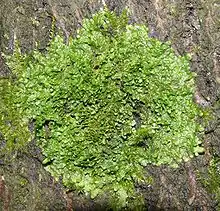Radula (plant)
Radula is a genus of liverwort, and is the only genus in family Radulaceae.
| Radula | |
|---|---|
 | |
| Radula complanata | |
| Scientific classification | |
| Kingdom: | |
| Division: | |
| Class: | |
| Order: | |
| Family: | Radulaceae Müll.Frib. |
| Genus: | Radula Dumort. nom. cons. |
It is a leafy liverwort. The appearance of the plants are as a scaly, green surface on the trunk of a tree, log or rock in a sheltered, moist out-door environment. The leaves are rounded, overlapping and consist of two unequal lobes. The smaller lobe is folded beneath the larger one.[1] The oldest fossil species is Radula cretacea from the Cenomanian aged Burmese amber of Myanmar, belonging to the subgenus Odontoradula. Molecular evidence suggests that the genus arose during the Triassic, around 227.8 Ma, and the crown group began to diversify during the Early Jurassic, around 176.3 Ma.[2]
Species include:[3]
- Radula boninensis
- Radula cavifolia
- Radula complanata[1]
- Radula deflexilobula Promma, L.N.Zhang et R.L.Zhu[5]
- Radula demissa M.A.M.Renner, 2013
- Radula javanica
- Radula jonesii Bouman, Dirkse & Yamada
- Radula kojana
- Radula laxiramea
- Radula obtusiloba
- Radula perrottetii
- Radula visianica C. Massal.
References
- Atherton, Ian; Bosanquet, Sam; Lawley, Mark (2010). Mosses and liverworts of Britain and Ireland a field guide (PDF) (First ed.). British Bryological Society. ISBN 9780956131010. Retrieved 26 December 2019.
- Bechteler, Julia; Schmidt, Alexander R.; Renner, Matthew A. M.; Wang, Bo; Pérez-Escobar, Oscar Alejandro; Schäfer-Verwimp, Alfons; Feldberg, Kathrin; Heinrichs, Jochen (2017-07-27). "A Burmese amber fossil of Radula (Porellales, Jungermanniopsida) provides insights into the Cretaceous evolution of epiphytic lineages of leafy liverworts". Fossil Record. 20 (2): 201–213. doi:10.5194/fr-20-201-2017. ISSN 2193-0066.
- Radula. The Plant List.
- Hussain, Tajammul; Plunkett, Blue; Ejaz, Mahwish; Espley, Richard V.; Kayser, Oliver (2018). "Identification of Putative Precursor Genes for the Biosynthesis of Cannabinoid-Like Compound in Radula marginata". Frontiers in Plant Science. 9: 537. doi:10.3389/fpls.2018.00537. PMC 5954354. PMID 29868043.
- Promma, Chatchaba; Zhang, Li-Na; Shu, Lei; Chantanaorrapint, Sahut; Renner, Matt A. M.; Zhu, Rui-Liang (2018). "Radula deflexilobula (Radulaceae, Marchantiophyta) from Thailand, a New Species based on Morphological and Molecular Data". Cryptogamie, Bryologie. 39 (4): 481–497. doi:10.7872/cryb/v39.iss4.2018.481.
External links
| Wikispecies has information related to Radula. |
| Wikimedia Commons has media related to Radula (plant). |
This article is issued from Wikipedia. The text is licensed under Creative Commons - Attribution - Sharealike. Additional terms may apply for the media files.